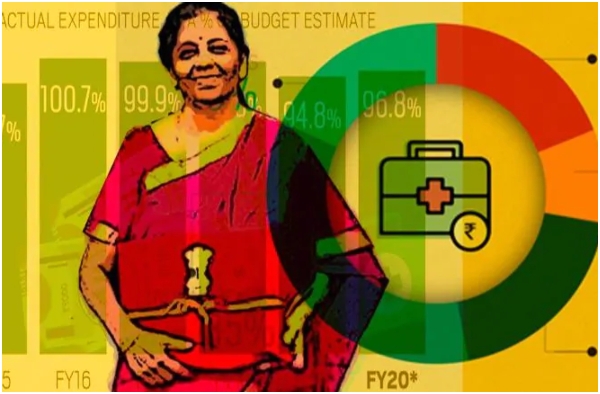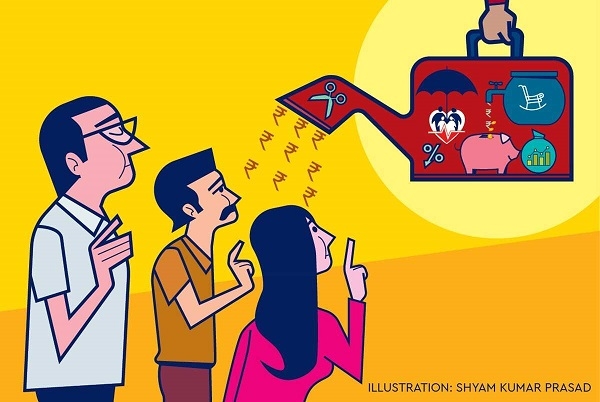Budget 2021 to be the one like never before!
Total Views |
The year that gone by was ‘न भूतो न भविष्यति’. Unimaginable and unfathomable. It took only an invisible virus to rightly show us humans our place in the scheme of things. It put breaks on our rampant campaign of conquering the earth in which we are just cohabitants and not sole inhabitants. The avarice to own that which is already free, the devastation, the selfish exploitation of the natural resources, the beliefs that money can buy anything have been shaken from the roots. That which was right till a year ago, no more seems so. Maybe we needed this shook up, to wake us up from our deliberate slumber.
This year has taught us the look at parameters like health, happiness, family, societal wellbeing as equally important as that of monetary wealth. It has compelled us to shift our concentration beyond money. The financial budget of the country will be presented in the parliament on 1st February 2021. Finance Minister Smt Nirmala Sitharaman in a run upto the budget has vowed that Union budget 2021 will be a ‘budget like never before’. An adversity like never before calls for a budget like never before. Besides prioritization of government spending to boost the economy, this year’s budget will predominantly revolve around the subject of Covid – 19.

Will the focus of spending be on holistic well being of the people? Will there be shift from concentrating only on GDP growth as an index to human welfare? The answers will be available in a day. Factually, we have already started on that path. At the beginning of the pandemic, when no one knew how severely the pandemic would affect India, there were estimates of around 300 million infected and a few million dead by July 2020. The response of the country by implementing rigorous lockdowns, to making available funds to the poorest of poor by way of money transfers to Jana Dhan accounts, implementing the biggest free food ration programs in the world for many months so to ensure on one remained hungry, introduction of loan moratoriums and guarantees to cushion the business community and individuals from defaults. All these measures concentrated on the humane angle rather than immediate economic revival. The focus was on the welfare of the people in times when an unknown enemy was marching towards us. Once the lockdowns were eased and the economy started opening up the government spending was concentrated on creating demand, a key to boost the economy. The response has been logical of looking after the people first and then helping them make money.
All have a lot of expectations from the Finance Minister about the various reforms to be announced in the budget. The taxpayers do not want to bear the extra burden of financing the Covid spending by the government. With approximately only 4.5% of the 1.3 billion population paying taxes, their expectations are rightly placed. The expectation is the expansion of the tax net by bringing in more people to pay taxes, rather than penalizing the ones who sincerely pay them every year.

The 63 million MSMEs (Micro, small & medium enterprises) in the country were the hardest hit by the stringent lockdown measures implemented at the beginning of the pandemic. The sector which is the second largest employment generator is looking for fundamental reforms by way of extending PLI (production linked incentive schemes), putting in place guidelines for public procurements from MSMEs etc which will help bring the sector back on recovery track. Covid sharply cut the returns of the investor community. The rates of fixed income earning securities reached at an all time low. The community turned to the stock market to fill up the losses. They expect change in taxation on dividends, capital gains, tax rates etc to instill confidence in the investors and lift the market sentiments.
Travel, tourism, and hospitality sectors expect financial aid and tax exemptions to help them rebound from one of the worst years they have faced. Banking sector reforms with further consolidation and recapitalization of PSU banks are also expected. Incentives for auto, housing, FMCG (Fast moving consumer goods) to name a few are all anticipated. Tomorrow at 11 am we will come to know about the various amendments the budget brings and whether it meets the expectations of the different stakeholders. Besides the regular amendments that are expected, expectations are also high that the budget will:
a) Giving priority to building a solid healthcare system across the country. Help expansion of the Ayushman Bharat (Insurance) scheme. Concentrate on setting up state of the art healthcare facilities where the masses have access to the same. Help bring healthy competition between the public and private healthcare providers and bring in some sort of price checks on private healthcare institutions.
b) Give rise to setting up a culture of innovation by providing adequate support to research and development. The budget will create such an environment which will help build confidence amongst innovators to take risks and think out of the box.
c) Be entrepreneur centric and pro wealth creation Unlike most developed countries we have a large number of population who are run their own businesses. Facilitating them by not only concentrating on ease of doing business but also cost of doing business will give them the much-needed fillip.
The expectation from the budget is quite high on the backdrop of once in a century Black Swan event like the Coronavirus. By creating a firm robust base for the people to have the confidence to take risks and innovate is what will propel our country to economic rebound. Unlike most developed countries our response till date to fight the pandemic has been proven right. The budget will also suitably strengthen the efforts of the country to meet the robust economic forecasts of international monetary organisations.
.
.
